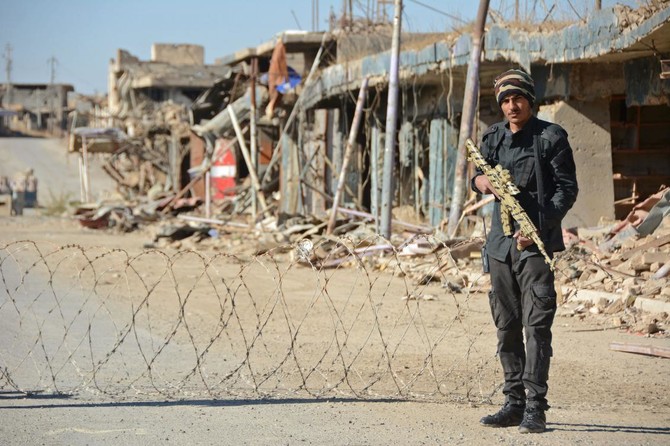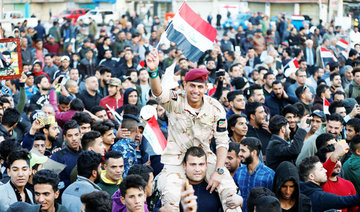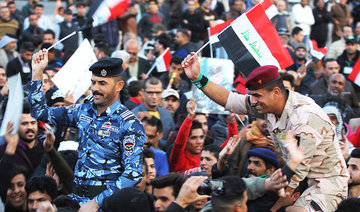BAIJI, Iraq: A white rocking horse and a child’s toy car lie abandoned on a dusty lane in the Iraqi city of Baiji, a small sign of the ruin that can be seen all around.
Two years after the jihadists of Daesh were forced from this one-time industrial hub, Baiji remains a devastated ghost city as pledges of funds to help rebuild life have failed to materialize.
Home to what was once Iraq’s biggest oil refinery, its rubble-strewn streets are lined by the twisted carcasses of buildings, and in 2016 it was declared a disaster zone by the national parliament.
“Up until now there has been no money to reconstruct the town despite the promises made by Prime Minister Haider Al-Abadi,” Khaled Hassan Mahdi, a member of the regional council, told AFP.
Instead, Mahdi said, all available funds have gone into financing Iraq’s military campaign against Daesh, which Hadi declared defeated after three years of brutal fighting.
“And even if the ministries unblock the money, it will only go to restoring infrastructure, water, roads, electricity, but not pay benefits to people or give them aid to rebuild their homes.”
For Baiji, 200 kilometers (124 miles) north of Baghdad, its role as a major industrial center boasting sprawling oil and chemical plants seems like a distant memory.
“It will be very difficult to rehabilitate the Baiji refinery, which was built in 1975 and used to produce 250,000 barrels a day, as so much equipment has been pillaged,” a high-ranking official in Iraq’s North Oil Company told AFP.
Even if the facility does get up and running again, the official said, then “it won’t have the same capacity as before.”
The level of devastation in Baiji is among the worst left behind after Baghdad’s punishing campaign to reclaim its towns and cities from the grip the jihadists, who fought fierce house-to-house battles to cling on to the city.
“Baiji is the most destroyed place in Iraq after western Mosul,” said council member Khazal Hammadi, referring to the obliterated old heart of the country’s second city.
Before the jihadist’s seized control in 2014 the city had a population of some 180,000 people.
“Now 90 percent of Baiji is destroyed and the people have still not returned,” city councillor Sheikh Hatef Bassam said.
Wearing a black and white checked keffiyeh headscarf, he insists that “the destruction was the work of the IS terrorists after local Arab tribes rejected their presence,” using a different acronym for Daesh.
But the full story of Baiji’s downfall is far more protracted and complex.
After the US-led invasion of Iraq in 2003, Baiji found itself at the heart of the so-called “Sunni triangle” where those loyal to ousted leader Saddam Hussein continued to wage a ferocious insurgency — and the oil infrastructure was attacked repeatedly.
Daesh swept into the city in June 2014 as the Iraqi forces collapsed and after more than a year in control were forced out by government troops and allied militias with the help of air power from a US-led coalition in October 2015.
Traffic has long ceased along Baiji’s wrecked main highway and, apart from a few military checkpoints, life is nowhere to be seen.
“The city is destroyed and the houses are uninhabitable,” said local militia commander Hajj Ibrahim Taha.
“The roads are destroyed, the water system is damaged, electricity is non-existent and all the people have left.”
Local police chief Saad Nafus said that some families come back from time to time to check their houses, but they have to get “authorization” from security officials who still worry about jihadists returning.
In a camp for displaced people run by charities in the region, three kilometers north of the city of Tikrit, former Baiji resident Amer Abbas has no idea if his home is still standing or not.
“We are afraid that we will find nothing if we go back,” he said.
Nearby, Said Imad Ahmed said he already knows full well that his house has been destroyed and that for the foreseeable future he will remain trapped in the camp.
“I don’t have any money to rebuild and the government has given us nothing,” he said.
“We have no choice but to remain here.”


























